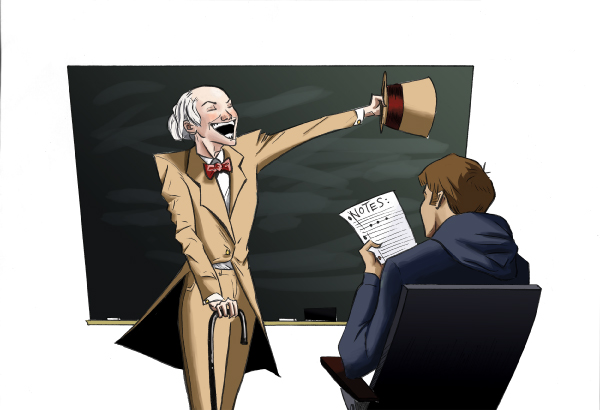Learn to teach, not to preach

By Tyler Dosaj
Feb. 2, 2010 2:17 a.m.
If you’ve ever left a lecture muttering, “This isn’t what I paid for,” you’re not alone.
UCLA is among the world’s top-ranked universities, and its world-class faculty is a testament to its rigorous hiring practices and ability to attract top candidates. But the backdrop of a stellar professorship brings the university’s few ineffective professors all the more sharply into focus.
I spent my fall quarter dreading a particular engineering lecture. Not because the professor was nasty or offensive but because the lectures tended to be monotonous monologues about the philosophy of the material rather than about the material itself.
The consensus among the students with whom I spoke was that the professor’s methods, self-described rather untenably as “good teaching,” were obtuse and simply not conducive to learning. This obliviousness to the class’ needs climaxed at the end of the quarter when the professor shirked all responsibility to lecture and devoted four sessions to junior high school-esque homework time.
Professors like mine are supposed to be brought up to par through end-of-quarter teacher evaluations. One look at BruinWalk told me this one was consistently unhelpful.
For student criticism to have any effect on a professor’s future teaching practices, there must be some kind of penalty for ignoring that criticism, and according to Vice Chancellor of Academic Personel Thomas Rice, there is.
Rice and the Council of Academic Personnel decide whether a faculty member is promoted to tenureship, and the teacher evaluations are an integral factor in those decisions.
“If the teaching evaluations were very negative it would make it much less likely the faculty member would get promoted,” Rice said.
But at the same time, Rice added that a professor’s research can sometimes override evaluations that are less than reverent.
“The idea that everyone is a great teacher is unrealistic,” Rice said.
At best, then, the teacher evaluations are a promotion of mediocre teaching. If professors are aware that they need only to avoid negative reviews to ensure their tenure, there is no incentive for them to become great.
This is not to say that the evaluations are particularly evaluative in the first place.
Consider the period during which students fill out the surveys. The anxiety of the week before finals can’t be conducive to an objective critique of a professor’s teaching capacity. And since the professor writes finals and finals aren’t done, students cannot wholly evaluate a professor’s abilities and gauge their own understanding of the material.
Not to mention that the fruits of the evaluations, if any, benefit next quarter’s class instead of the respondent, so there’s little incentive to give them much thought.
The problem with the influence of personal taste on evaluations is that the quality that makes a professor likeable may be as juvenile as their willingness to dish out good grades.
UCLA’s Office of Instructional Development suggests attaching questionnaires to exams and assignments.
Responses to these questionaires would help professors find the root of a student’s lack of understanding on specific problems. This attention to detail might be more effective in improving lectures than the general response of end-of-quarter evaluations.
Whatever the change, UCLA needs to find a better way to keep professors off BruinWalk’s walk of shame.
E-mail Dosaj at [email protected]. Send general comments to [email protected].


